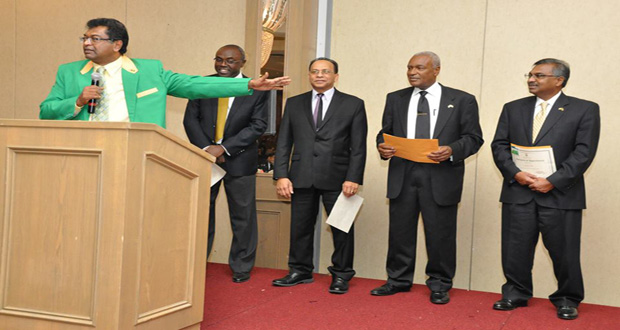Should this letter writer, republish a 'PNC' version of his letter? Or has the issue been resolved by the new administration?
Hold directors accountable for billions of uncollected taxes
DEAR EDITOR,
I read with interest an article in the Kaieteur News (December 23, 2011) headed “Country loses billions in revenues…..GRA going after big contractors, businesses in 2012”.
I get the distinct impression that the Guyana Revenue Authority (GRA)’s boss, Khurshid Sattaur and his Agency are at a dead end after the Corporations failed to comply with the Court’s Orders to pay up.
The corporations simply fold up, move out the assets, restructure and become shell companies. Then the money trail becomes blurred or completely lost.
In essence what the directors are doing is to operate with corporations that have no substantial assets but have all the debts owing to the Government.
The assets are held by individuals, including directors and corporations that are not trading and, therefore, not incurring income taxes, value added tax (VAT), duties, payroll source deductions and other obligations.
Pursuing the shareholders of the corporations is a futile exercise as they are protected by limited liability status emanating from the corporations.
The veil of limited liability stands as a wall between the affairs of the shareholders and directors and that of the corporations. GRA can request for this wall to be pierced in certain circumstances. However, under the current laws, these circumstances are very restricted, as in the case of fraud.
I would like to suggest that a more modern approach be used whereby the directors of the corporations become personally liable.
Corporate directors and other senior officers who hold office when the corporation fails to deduct, withhold, collect, remit, or pay amounts for salary, wages and certain benefits, VAT, income tax and duties, may be personally liable, together with the corporation, to pay part or all of these amounts.
After all, these are amounts held in trust for the Government, and the directors and other senior officers are the trustees of these funds.
Certain individuals, including officers, employees, and others who are not legally appointed as directors, but who perform the functions that directors would perform, may be liable as de facto directors.
Of course, there must be certain rules of liability, obligations on GRA and time limitations to institute proceedings against the directors and other senior officers. GRA must demonstrate its inability to recover the amounts directly from the corporations.
It must also commence proceedings to assess the directors within a reasonable time, say no more than two years after the directors have ceased to be directors. Also, the directors must be given the opportunity to demonstrate that they have exercised the degree of care, diligence, and skill required to prevent the failure.
The implementation of my suggestions would not only go a long way for the Government to recover large sums of money but to cause directors to take their responsibilities seriously.
There are too many instances where directors do not understand their responsibilities or they lack the necessary abilities to carry out the serious functions required of directors. Many individuals are holding several directorships in various private and Government corporations.
They are reaping lucrative remunerations without commensurate responsibilities. They need to understand that directorship is not a mere window-dressing exercise.
It is grotesquely unfair for workers to have large chunks, in many cases over one-third, of their hard-earned wages deducted by their employers and not remitted to the Government. These amounts are deducted under the PAYE system to cover the workers’ pension, national insurance and income taxes.
Instead, the employers hoard these moneys, fail to remit to the Government and eventually the directors and others in decision-making position fleece the money.
Similarly, the public pay sixteen percent VAT on their purchases to the businesses, which should be forwarded to the Government. Instead the businesses fail to pass on these amounts to the Government and pocket these moneys. Someone needs to be held accountable. Those who are responsible for the company’s affairs should bear full responsibility.
The Government of Guyana must start off by drafting appropriate legislation and setting up the requisite administrative system to hold directors and other executives responsible for collecting and remitting taxes, duties and statutory deductions on a timely basis.
Guyana Revenue Authority should be given the power to make Demand Requirement on Companies and Directors without having to seek permission from the Courts. Further, GRA can be empowered to place certain Personal Property Security lien on companies’ and directors’ properties.
For GRA’s part, it should immediately introduce stricter enforcement of timely filing of Returns and remittances with installments based on prior years and raise estimated assessments for non-compliant filers. It should also withhold any amounts owing to the taxpayer where the taxpayer is non-compliant in filing Returns or owes the Government. These measures, if carried out diligently, should lessen the Government’s exposure to uncollected taxes.
Finally, bringing into the picture, directors and other officers of corporations will help to level the playing field between the treatment of businesses operating as corporations versus sole proprietors, partnerships and not-for-profit organizations.
In Guyana, the vast majority of corporations are owner-managed; the distinction between corporate and non-corporate business entities is a mere formality. In the case of sole-proprietorships and partnerships, the owners cannot hide behind the wall of limited liability. There is no distinction between their business assets and personal assets. GRA can level claim against their personal assets to collect unpaid amounts.
I am arguing that directors and other officers who do not properly conduct the Corporations affairs and cause “trust funds” to be “misappropriated” be held personally liable, including their personal assets.
I am also arguing that the Government and Guyana Revenue Authority should bear responsibility for putting in place appropriate legislation, policies and administration to ensure that all sources of revenue are properly assessed and collected on a timely basis and those responsible be held accountable.
Tameshwar N. Lilmohan
Toronto


